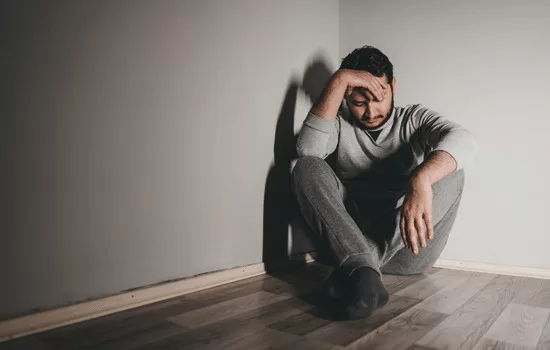Takeaway: Each person’s experience with depression is different. In this post, we’ll review some of the common signs, as well as some of the lesser known symptoms of depression, and tips for getting help.
When we think of how depression is typically portrayed in the media or popular culture, we picture a person who can’t get out of bed, care for themselves, or find meaning in life. While this is certainly how some people experience depression, it’s not the only way.
Sometimes, people experience unusual symptoms of depression. Since they may not associate these symptoms with mental illness, they may not seek treatment. However, with the right support, you can get to the root of your depression and improve your quality of life.
Learning more about both the typical and uncommon signs of depression can arm you with the knowledge you need to be mindful of your mental health-and even empower yourself to get help.

What is depression?
Depression is a common mental illness. According to the National Institute of Mental Health (NIMH), approximately 21 million adults in the United States have experienced depression at least once in their lives.
It’s normal to feel sad or a little off from time to time, but depression is much different. Severe depression can significantly impact a person’s functioning, including their emotional, physical, and mental health, as well as their job, relationships, and daily life.
Types of depression
There are several different types of depression, and each person’s experience is different. These diagnoses exist to identify common symptoms that people have-not act as labels or markers of identity. Hopefully, determining which type of depression you have can also provide validation and a reminder that you are not the only person who struggles in this way.
Major depressive disorder
Major depressive disorder is a type of mental illness in which a person experiences depression symptoms for several weeks. Some people may experience a single episode, while others find that their symptoms of depression ebb and flow throughout their lifetime.
Postpartum depression
Many new moms experience the baby blues in the first days or weeks following birth. However, these feelings typically go away on their own. Postpartum depression has more intense symptoms and lasts for a longer period of time.
Bipolar depression
Bipolar depression, or bipolar disorder, is a mental health condition that is defined by periods of depression and periods of mania. The symptoms of depression in people with bipolar disorder are the same as those with other types of depression. During manic episodes, people may experience elevated mood, increased energy, risky or impulsive behavior, and more.
Common depressive symptoms
While each person has a unique experience with depression, there are common symptoms. Mental health professionals use the Diagnostic and Statistical Manual (DSM) to diagnose depression and other mental health conditions. In order to meet the criteria for a diagnosis of depression, a person must present certain symptoms. Here are some of the most common ones.
Depressed mood
Understandably, depressed mood is one of the well known symptoms of depression. This can feel slightly different from person to person, but it typically involves sadness, guilt, and other negative emotions. It is considered separate from grief experienced after a loss or feeling upset about a particular life stressor or situation.
Loss of interest in activities
Alongside low mood, loss of interest or pleasure in activities once enjoyed is another common depression symptom. People might struggle to find motivation to engage in hobbies or even in day to day activities. Even if they are able to find the energy to do so, they might not enjoy those activities in the same way they once did.
Sleep problems
Insomnia and sleeping too much are both common symptoms of depression. People with depression can struggle to get out of bed or may sleep to avoid their difficult feelings. On the other hand, those uncomfortable thoughts and emotions may make it difficult to fall asleep or stay asleep.
Thoughts of self harm or suicide
Unfortunately, many people with severe depression experience suicidal thoughts or the desire to self harm. These thoughts and urges must be taken seriously, so it’s important to reach out for help if you experience them. With proper treatment, you can learn how to manage these symptoms and start feeling better.
If you or someone you know is in need of immediate support, please contact the National Suicide & Crisis Lifeline by calling or texting 988 or visiting 988lifeline.org.

Uncommon depression symptoms
Many people are familiar with a certain archetype of depression. However, there are many uncommon or “weird” symptoms of depression that can fly under the radar. While experiencing these symptoms doesn’t necessarily mean that you have depression, it’s important to be aware of them.
Irritability
Sadness is one of the most common emotions that is associated with depression. However, irritability is an unusual sign of depression that can often go unnoticed. Some people with depression (or other mental health conditions such as anxiety) experience irritability, agitation, and restlessness but may not necessarily attribute it to a larger issue.
Distractions and numbing
Depression can be a painful, isolating experience, so it’s natural to have the desire to distract yourself from those feelings. People may engage in substance use, overspending, endless scrolling on social media, or other activities to take their mind off of their depression.
While some level of distraction can be adaptive, constantly numbing out can lead to negative consequences and make it difficult to get to the root of your struggles.
Physical symptoms
When we think of depression, we often think of the mental and emotional impact. However, physical symptoms are some of the lesser known symptoms of depression. Fatigue, low energy levels, appetite changes, and weight loss or weight gain are all signs of depression to be aware of.
Withdrawing from others
Low self esteem is a common symptom of depression. As a secondary effect, feeling bad about yourself can cause you to withdraw from the people in your life. It may feel difficult to engage with your loved ones if you’re feeling down, even if you could really use their support.

Getting support for depression
If you’re unfamiliar with the uncommon signs of depression, it may feel overwhelming to learn about all the ways that depression can present itself. However, there are ways to heal. Here are just a few.
Self help strategies
While self care isn’t a replacement for professional help, it is an important part of managing your depression symptoms. There are many different ways to practice self care, and it might take time to find what works best for you. If you’re unsure where to start, try one of these.
Mindfulness exercises
According to current research, mindfulness can be a helpful way to treat depression. At its core, mindfulness is about growing your awareness of your thoughts, feelings, and physical sensations. There are tons of different ways to do this, including meditation and deep breathing exercises. Mindfulness apps can also be a useful tool.
Eating a balanced diet
While the relationship between your diet and your mental health is complex, studies show that there is a link. If you have specific questions about your nutrition, it’s best to consult a medical professional. However, making sure you eat full meals and incorporate fruits and veggies is a good place to start.
Incorporate gentle movement
Physical exercise can help to improve symptoms of depression. Low motivation, fatigue, and lack of energy can make it difficult to work on your fitness, but you can still reap the benefits by trying gentle movement like walking, yoga, or stretching.
Other resources and supports
Again, self care is an important piece of your healing journey. However, you shouldn’t have to navigate your mental health alone. Here are some suggestions for getting support for your depression.
Get professional help
Many people find that working with a mental health professional is beneficial for their mental health. Your therapist will cultivate a safe space for you to express yourself without judgment. By processing your thoughts and feelings with a professional, you can gain insight that will help you better understand yourself and take meaningful steps toward change.
Try a support group
Support groups are another useful resource for coping with mental illness. Hearing from other people who have similar experiences can be incredibly validating and help you remember that you’re not alone. You may even feel empowered to share your experience with others and offer them support.
Online depression therapy can help you make sense of your common and lesser known symptoms of depression
Experiencing depression isn’t easy, but it is possible to heal. Our team of therapists at Introspection Counseling Center offer online depression therapy that is customized to your unique needs, preference, goals, and symptoms.
Through our work together, you will learn more about where your depression comes from. Armed with this knowledge, we can collaborate to find more helpful thought patterns and coping skills that will help you thrive in your day to day life.
We understand that reaching out for help isn’t easy, especially if you feel unsure whether or not you have depression at all. Know that whether you have a typical presentation of depression or seem to have more uncommon depression symptoms, we are here to support you.
If you’re interested in learning more about how we can help, we encourage you to reach out. We offer free 15-minute consultations so you can ask questions and get a sense for whether we might be a good fit for each other. We look forward to hearing from you!




